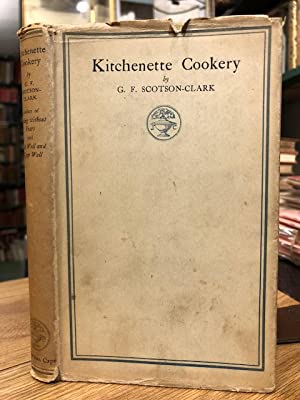George Frederick Scotson-Clark

Some cooks may be artists in their own way, but artists are rarely cooks. But if this little book, Eating without Fears, a minor best-seller in 1924 ( we have a third edition which we found in the Jot 101 archive at HQ) is any indication, the fin de siecle artist, G. F. Scotson –Clark was certainly both, albeit in a very minor way.
Scotson-Clark, the son of a famous organists and composer was the same age as his fellow illustrator and friend Aubrey Beardsley, and was in the same class with him at Brighton Grammar School. But while Beardsley left school to pursue a brilliant but short career, his friend decided to try his luck in the City ( his biographers described him as a ‘ businessman ‘), only to change direction at the age of twenty when he emigrated to the United States. Here he may well have continued as a businessman for all we know, but what we do know is that his natural talent for drawing ( he appears to have been self-taught) saw him supplying art work for several American newspapers and magazines, including the New York Sunday World. He also designed posters for The Outing and worked as a stage and costume designer.
Then, in 1897, aged twenty-five, Scotson-Clark returned to England, where he remained until his death. He continued to design posters, mainly for the theatre, and his interest in the Music Hall is strongly evident in perhaps his best-known ( and certainly most expensive book), The Halls, which appeared in 1906. Scotson-Clark, though talented as a graphic artist , lacked the amazing originality of Beardsley, hence perhaps his comparatively low-profile as an illustrator today. His plates for The Halls, for instance, are strongly influences by the ‘ Beggarstaff Brothers ‘ who were very popular at around the same time.
It is likely that Scotson-Clark might have scratched a living as a bog-standard graphic designer had not the surprise success of his modest contribution to the cookbook industry occurred. From Eating Without Fears we may glean, not only some valuable tips on how and how not to cook simple dishes, such as roast chicken and Christmas pudding, but also biographical facts concerning his life, both in England and the States. We discover, for instance, that around the age of thirty – two he abandoned his bachelor life to marry ‘the most perfect of wives ‘. We also get some glimpses of his life in the States. His book suggests that he seems to have been a sort of amateur gastronomist and nutritionist from his early years. In one chapter he refers to advice offered by several American medics in the American Medical Review of Reviews. He quotes Dr F .J. Underwood of the Mississippi State Board of Health:
‘It is preferable to start the day with a fairly substantial breakfast, consisting of fruit, cereal, bacon and eggs, etc; eat a light but nourishing lunch and have a heavy meal at six in the evening. I don’t think there is any doubt but what one could do better mental work by following out this plan ‘.
One hesitates to quarrel with the good doctor on this, but medical authorities today, particularly the ubiquitous Dr Mosley, of TV and radio fame, are unlikely to agree with this regime, unless the bacon was cut out, and the fruits recommended were apples, blueberries and raspberries.
Another physician, a certain Dr W. H. Sharpley of Denver also disagreed with Dr Underwood:
‘ I really think that a light breakfast in the morning and the main meal about noon and a light supper at night is the preferable way…’
A much more drastic solution to digestive disorders is offered by Dr Thomas F. Collins of Adamsville, Pennsylvania:
‘The matter of taste is what is ruining the American digestive system. We eat things because we like the taste of them, even though we know they contain the wrong elements for us. Therefore, let us eat regularly reasonable amounts of the things we should have, disregarding the taste.’
In conclusion Scotson-Clark recommends that
‘ Moderation and wise selection in both eating and drinking will ensure good health, but excess in either will undoubtedly result in discomfort, indigestion, and chronic ill-health.’
In a future Jot on Scotson-Clark we will see if he put this advice into practice himself.
[R.M.Healey]
